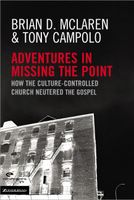I'm on to another McLaren book...Adventures in Missing the Point: how the culture-controlled church neutured the gospel. I would subtitle it...Why we always seem to ask the wrong question.
Unlike the McLaren triology (see post below) this book takes a more direct approach to rethinking the Christian faith. Plus, it includes Tony Campolo. Tony and McLaren share chapter writings and then each comment on each other's thoughts. It's a good primer for the things that were touched on in A New Kind of Christian.
Tony and Brian rethink everthing from the Bible, to salvation, to the end times, to women in ministry, to the environment and more. I think it's very helpful to hear these two respected pastors/theologians talk about issues that many people think are pure black and white. In reality, there is a range of thought in Christendom and I find it helpful to hear it all, not just one version.
I was discussing this book with a few others last week and we noted how much more intertested people seem to be in the Christian message if it's not presented it in such black and white - "all or nothing" ways. As I've written before, no one likes things crammed down their throat. When we sense people have an agenda (and that agenda involves us!) we naturally back away. This book softens the edges of the faith and helps people find an entry point to it.



